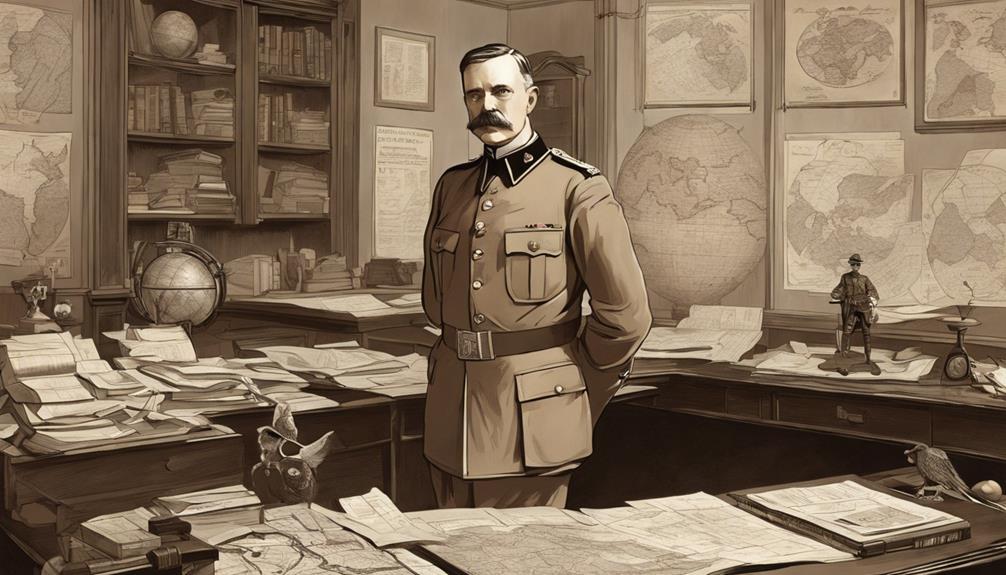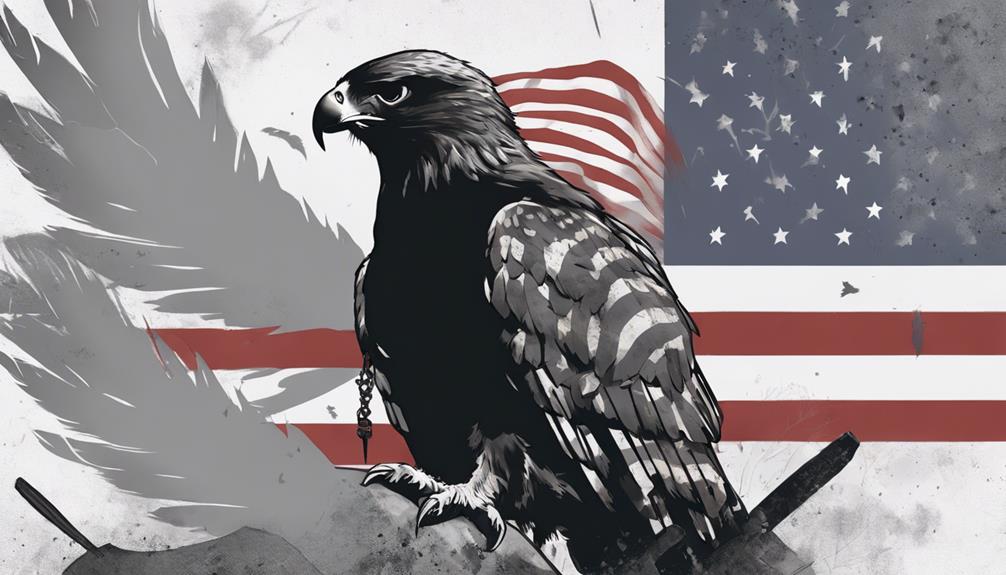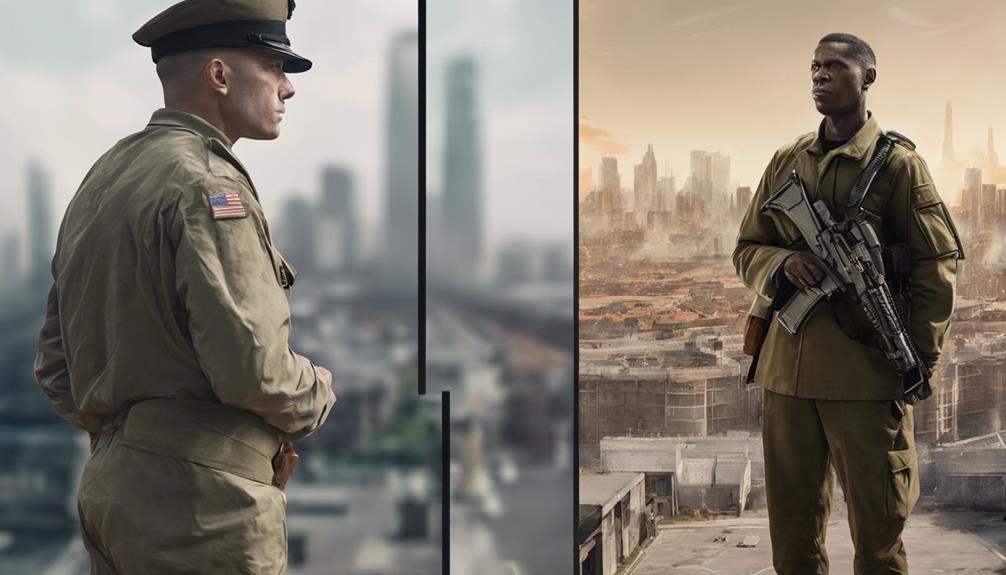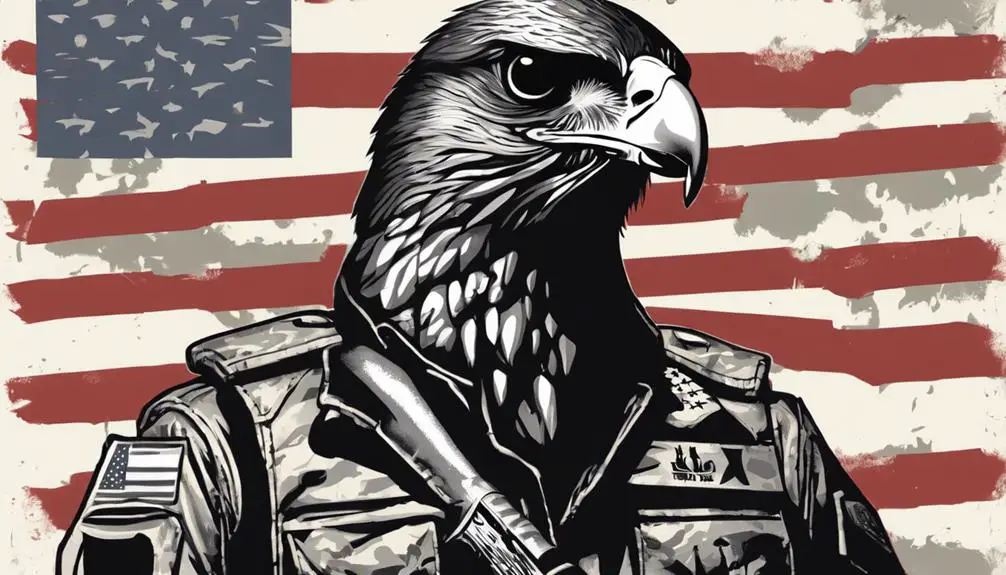You've heard the term "chicken hawk" tossed around in political discussions, but what does it really mean? Originating in the 1960s, it's a pejorative label for war-advocating officials who haven't served in the military themselves. This hypocrisy sparks discussions on accountability and critiques inflated patriotism. It's tied to the War Era of the 1960s and 1970s, when anti-war sentiment rose, and polarization between hawks and doves intensified. As you explore this term further, you'll uncover the blurred lines of patriotism, the impact on civilian-military relations, and the cultural significance of military service.
Origins of the Chicken Hawk Term

Investigate the history of military slang, and you'll uncover that the term 'chicken hawk' originated in the 1960s, emerging as a pejorative label for politicians and officials who vehemently advocate for war, yet have never seen combat themselves. This etymological analysis reveals that the term is rooted in folkloric origins, drawing parallels between the bird of prey and the armchair warrior.
The chicken hawk, a bird known for its cowardly nature, is an apt metaphor for those who loudly beat the drums of war while avoiding the battlefield themselves.
As you explore further into the history of this term, you'll find that it was initially used by veterans and soldiers to criticize politicians who sent them to fight wars without having experienced combat themselves.
The term 'chicken hawk' is a scathing critique of hypocrisy, implying that those who advocate for war aren't brave enough to fight themselves.
This term has since become a powerful tool for critiquing those who engage in armchair warfare, sparking important discussions about accountability and the true costs of war.
Hypocrisy in Armchair Warfare
When you scrutinize the actions of self-proclaimed war hawks, you'll often uncover a glaring discrepancy between their bellicose rhetoric and their own lack of military service. This hypocrisy is a staple of armchair warfare, where individuals cheer on military interventions without having served themselves. This moral disconnect is revealing, as it exposes the ego dynamics driving their aggressive posturing.
Some common characteristics of these chicken hawks include:
- Inflated sense of patriotism, often accompanied by a lack of personal sacrifice
- A tendency to conflate military strength with national greatness
- Overreliance on simplistic, black-and-white thinking when discussing complex geopolitical issues
- A marked absence of nuanced understanding of the human cost of war
- A propensity to shift blame onto others when their military adventures go awry
As you explore further into the rhetoric of these armchair warriors, you'll begin to notice a pattern of hypocrisy and moral disconnect. Their ego dynamics drive their aggressive posturing, rather than a genuine concern for national security or the well-being of those serving on the front lines.
The Blurred Lines of Patriotism

As you examine the rhetoric of self-proclaimed patriots, you'll find that their inflated sense of nationalism often stems from a superficial understanding of what it means to be patriotic. They confuse national pride with blind loyalty, neglecting the complexities of moral ambiguity. This patriotic fervor is often fueled by a narrow political ideology, which can lead to a blurred sense of what it truly means to be patriotic.
You may notice that these individuals often conflate patriotism with support for military action, without critically evaluating the motivations behind such actions. They may also demonize those who question the status quo, labeling them as unpatriotic. However, true patriotism requires a nuanced understanding of the complexities involved, acknowledging the moral gray areas and embracing critical thinking.
As you navigate these blurred lines of patriotism, remember that national pride shouldn't be based on simplistic notions of 'us versus them.' Instead, it should stem from a deep understanding of your country's history, its flaws, and its potential for growth. By adopting a more nuanced perspective, you can move beyond the superficial and cultivate a more authentic sense of patriotism.
Historical Context of the Slang
Delving into the historical context of 'chicken hawk' reveals that this slang term originated in the mid-20th century, emerging from the intersection of military culture and political discourse. As you explore the roots of this term, you'll find that it's deeply tied to the War Era of the 1960s and 1970s. During this time, the United States was embroiled in conflicts abroad, and the cultural landscape was marked by protests, social unrest, and shifting values.
Here are some key factors that contributed to the emergence of 'chicken hawk' as a slang term:
- Rise of anti-war sentiment: As the Vietnam War dragged on, public opinion began to turn against military involvement, and critics of the war effort were labeled as 'doves.'
- Political polarization: The 1960s and 1970s saw a growing divide between hawks, who supported military action, and doves, who advocated for peaceful resolution.
- Cultural significance of military service: Military service was seen as a rite of passage, and those who avoided service were viewed as cowards or opportunists.
- Emergence of the 'chicken hawk' archetype: The term 'chicken hawk' emerged as a way to describe individuals who advocated for war but had avoided military service themselves.
- Slang as social commentary: The use of 'chicken hawk' as a slang term served as a form of social commentary, highlighting the perceived hypocrisy of those who supported war efforts but refused to serve themselves.
Impact on Civilian-Military Relations

By the 1970s, the 'chicken hawk' label had become a potent symbol of civilian disillusionment with military leadership, eroding trust between the two groups and fueling a widening gap in their values and interests. As you examine the impact of the term on civilian-military relations, you'll notice a significant shift in civilian perception. The 'chicken hawk' phenomenon contributed to a growing Military Disconnect, where civilians began to question the motivations and actions of military leaders.
| Civilian Perception | Military Response |
|---|---|
| Loss of trust in military leadership | Increased emphasis on public relations |
| Growing disillusionment with military actions | Efforts to improve transparency and accountability |
| Widening gap in values and interests | Attempts to rebuild Public Trust through community outreach |
| Decreased support for military interventions | Shift towards more targeted, strategic operations |
| Increased scrutiny of military leaders | Greater emphasis on accountability and oversight |
As you can see, the 'chicken hawk' phenomenon had far-reaching consequences for civilian-military relations. The Military Disconnect grew, and Public Trust was eroded. It's essential to understand the impact of this term on the relationship between civilians and the military, and how it has shaped our current understanding of military leadership and accountability.
Frequently Asked Questions
Is the Term "Chicken Hawk" Exclusively Used in the US Military?
When you explore the term 'chicken hawk,' you might wonder if it's exclusive to the US military.
Historically, the phrase originated in the 19th century, referring to a type of hawk that preys on chickens.
In a military context, it emerged in the 1980s to describe politicians who advocate for war but avoided military service themselves.
While it's not unique to the US military, its usage is more prevalent within American military culture, reflecting a historical context of political criticism and anti-war sentiment.
Can Women Also Be Referred to as "Chicken Hawks"?
You might wonder if women can be called 'chicken hawks.' Without considering the military slang context, the term's meaning implies a person who avoided military service yet supports war efforts. Logically, this label shouldn't discriminate based on gender.
However, in reality, female warriors often face gender bias. Hence, it's unlikely women would be referred to as 'chicken hawks' due to societal perceptions and stereotypes surrounding women in combat roles.
Is the Term "Chicken Hawk" Considered Derogatory or Pejorative?
As you explore the term 'chicken hawk,' you'll find that its etymological roots are complex. In general, the term can be considered derogatory or pejorative, implying cowardice or predatory behavior.
Culturally, it implies someone who avoids direct involvement but profits from others' risks. In this light, the term's connotation is negative, suggesting a lack of courage or integrity.
Are There Any Notable Public Figures Labeled as "Chicken Hawks"?
As you explore the concept of 'chicken hawks,' you'll find that certain public figures have been labeled as such by their political critics. You might recall famous hypocrites like Dick Cheney, who avoided military service himself yet advocated for war.
Similarly, Rush Limbaugh, a vocal supporter of the Iraq War, dodged the draft during the Vietnam era. These individuals have been accused of promoting military action while avoiding service themselves, earning them the 'chicken hawk' label.
Can a Veteran Be Considered a "Chicken Hawk" After Their Service?
You're wondering if a veteran can be considered a 'chicken hawk' after their service. Let's break it down.
Typically, a veteran's service motives are separate from their post-service actions. If a veteran advocates for war or military action without having served in a similar capacity, you might question their motives.
However, it's essential to distinguish between their service and post-service actions. If their post-service actions align with their service motives, it's less likely they'll be labeled a 'chicken hawk.'
Conclusion
As you stand on the sidelines, cheering on war efforts from the comfort of your living room, remember the weight of your words. On one hand, you're espousing patriotic fervor, waving the flag of national pride.
On the other, you're dodging the very same sacrifices you're asking of others. The chicken hawk's cry echoes through history, a haunting reminder of the hypocrisy that separates armchair warriors from those who truly bear the burden of war.







